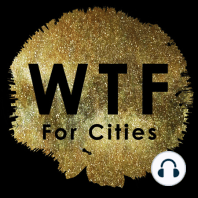1 min listen

166R_What makes a city ‘smart’? (research summary)
166R_What makes a city ‘smart’? (research summary)
ratings:
Length:
9 minutes
Released:
Oct 23, 2023
Format:
Podcast episode
Description
Are you interested in synthetising a city’s intelligent to be smart?
Summary of the article titled What makes a city ‘smart’? from 2016 by Emine Mine Thompson, published in the International Journal of Architectural Computing.
Since we are investigating the future of cities, I thought it would be interesting to see city governance using information and communication and sensing technologies. This article investigates the use of such tools by city governments and the shortcomings of such approaches.
As the most important things, I would like to highlight 3 aspects:
While data analytics, administrative control centres, social media, city apps, and other tools offer insights to the city itself here and now, the solutions, visions, and predictions about the city should not only rely on the technology and the data, but also include all stakeholders from the city in order to achieve smart but also human-centred urbanism.
The smart city concept is not only for creating new holistic systems without siloes but also about improving current systems with an appropriate level of technological interventions.
Overall, smart city agenda should be based upon long-term vision, people and processes as the main drivers.
Find the article through this link.
Abstract: Taking advantage of information and communications technology tools and techniques for city administration, whether it is for urban planning activities, for transport solutions or many other purposes, is not a new concept. However, in order for a city to be classified as ‘smart’, a synthesis of intelligence that transcends mere utilisation is essential. This article analyses the increasing use of information and communications technology and sensing technologies in cities by examining this new way of city governing from a critical perspective. Existing projects and initiatives were investigated to find out how, and to what extent, these tools are being employed by cities. The advantages and the current shortcomings of smart city are also discussed in order to understand the viability of using these tools.
Connecting episodes you might be interested in:
No.132 - Interview with Michael Batty about data use in cities;
No.156 - Interview with Fanni Melles about the need for a long term vision;
You can find the transcript through this link.
What wast the most interesting part for you? What questions did arise for you? Let me know on Twitter @WTF4Cities or on the wtf4cities.com website where the shownotes are also available.
I hope this was an interesting episode for you and thanks for tuning in.
Music by Lesfm from Pixabay
Summary of the article titled What makes a city ‘smart’? from 2016 by Emine Mine Thompson, published in the International Journal of Architectural Computing.
Since we are investigating the future of cities, I thought it would be interesting to see city governance using information and communication and sensing technologies. This article investigates the use of such tools by city governments and the shortcomings of such approaches.
As the most important things, I would like to highlight 3 aspects:
While data analytics, administrative control centres, social media, city apps, and other tools offer insights to the city itself here and now, the solutions, visions, and predictions about the city should not only rely on the technology and the data, but also include all stakeholders from the city in order to achieve smart but also human-centred urbanism.
The smart city concept is not only for creating new holistic systems without siloes but also about improving current systems with an appropriate level of technological interventions.
Overall, smart city agenda should be based upon long-term vision, people and processes as the main drivers.
Find the article through this link.
Abstract: Taking advantage of information and communications technology tools and techniques for city administration, whether it is for urban planning activities, for transport solutions or many other purposes, is not a new concept. However, in order for a city to be classified as ‘smart’, a synthesis of intelligence that transcends mere utilisation is essential. This article analyses the increasing use of information and communications technology and sensing technologies in cities by examining this new way of city governing from a critical perspective. Existing projects and initiatives were investigated to find out how, and to what extent, these tools are being employed by cities. The advantages and the current shortcomings of smart city are also discussed in order to understand the viability of using these tools.
Connecting episodes you might be interested in:
No.132 - Interview with Michael Batty about data use in cities;
No.156 - Interview with Fanni Melles about the need for a long term vision;
You can find the transcript through this link.
What wast the most interesting part for you? What questions did arise for you? Let me know on Twitter @WTF4Cities or on the wtf4cities.com website where the shownotes are also available.
I hope this was an interesting episode for you and thanks for tuning in.
Music by Lesfm from Pixabay
Released:
Oct 23, 2023
Format:
Podcast episode
Titles in the series (100)
Trailer for What is The Future for Cities? podcast by What is The Future for Cities?